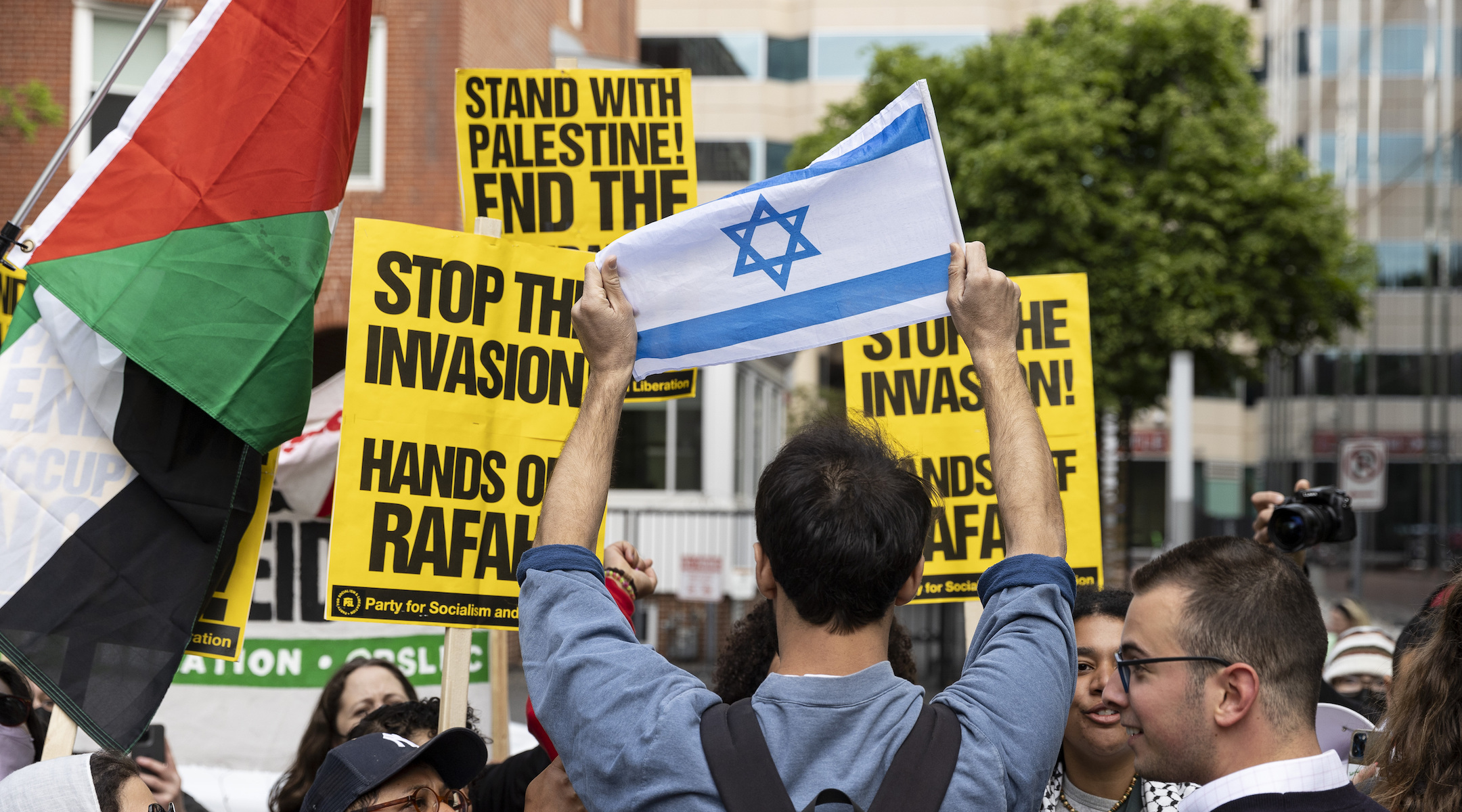Congress cancels hearing on George Washington U protests after police clear encampment and arrest demonstrators
Shortly after the arrests, the Republican-led congressional committee canceled the hearing featuring D.C. Mayor Muriel Bowser and police chief Pamela Smith

A man holds an Israeli flag while counter-demonstrating against a pro-Palestinian protest at George Washington University in Washington, D.C., April 25, 2024. Photo by Mostafa Bassim/Anadolu via Getty Images
(JTA) — Police in Washington, D.C. cleared a pro-Palestinian encampment from the campus of George Washington University and arrested 33 people early Wednesday, hours before a Congressional hearing was set to pressure local leaders on their response to the protest.
Shortly after the arrests, the Republican-led congressional committee canceled the hearing. Lawmakers had planned to grill D.C. Mayor Muriel Bowser and police chief Pamela Smith on why, prior to Wednesday morning’s arrests, the district had not clamped down on “unlawful activity and antisemitism” at the encampment. Washington police had previously rejected the university’s pleas to intervene on campus, citing the optics of disciplining protesters.
The arrests also follow the publication of dueling faculty letters supporting and opposing the encampment. One of the professors who had circulated the anti-encampment letter backed the arrests.
“It’s always upsetting when police have to get involved in this way, but I think there was no alternative,” Daniel Schwartz, a professor of Jewish history at GWU, told the Jewish Telegraphic Agency. “Their presence was a disturbance to many students, especially given the location. Final exams were being moved.”
The letter Schwartz and a non-Jewish GWU colleague, Eric Arnesen, had circulated was signed by more than 100 university faculty and staff, many of them Jewish and most from the DC area.
The letter endorsed protecting peaceful protest but expressed concern about the allegations of antisemitism and said the demonstrations weren’t representative of the campus as a whole.
“While we oppose any attempt to ascribe antisemitic intent to all or even most of the protesters, it is indisputable that there have been numerous cases of harassment, abuse, and even physical violence against Jewish students on college campuses since October 7,” Schwartz and Ernesen’s open letter states. Later, they write, “We agree that student speech and protest should be respected — provided they follow reasonable university regulations and do not veer into the realm of harassment.”
A separate open letter from area faculty that had expressed support for the encampments, and downplayed reports of antisemitism among their participants, was signed by more than 500 people.
Universities across the country have struggled to find the right response to the encampments, which have gone up at dozens of schools over the past few weeks. Some have struck deals to clear them peacefully, and others have sent in law enforcement to break them up, leading to more than 2,500 arrests nationwide.
Jewish students and faculty on campuses with encampments have reported being harassed by protesters and say they create a hostile atmosphere, while many of the protests have featured Jewish contingents.
Protests at GWU over the Israel-Hamas war have often taken on a more aggressive tone than similar campus protests. Last fall the school suspended its chapter of Students for Justice in Palestine, and the White House specifically called out the activists’ actions, after “Glory to our martyrs” was projected onto the side of a campus building named after a Jewish donor.
The campus had calmed down since the fall, but tensions flared up again with the recent encampments, Schwartz said. Recent encampment behavior has reportedly included blocking students’ ability to move through campus, replacing an American flag with a Palestinian flag and putting a keffiyeh onto a campus statue of George Washington. GWU President Ellen Granberg has also been a direct target of the protesters, both at fundraisers and on campus.
When the encampments sprang up in late April, GW Hillel called for the university “to take all needed actions to maintain a safe campus environment for all,” calling them “an embrace of hate” and stating, “We say unequivocally that no student’s rights to be safe, to pursue their education, and to be proud Jews should be compromised in response to another student’s actions.”
Days before the arrests, Granberg made a plea to D.C. law enforcement to help manage the “illegal” protests. Both Granberg and police said they gave the protesters several warnings to leave the encampment before arrests were made and offered an alternative protest site. Granberg wrote in a message to campus that the administration had “conducted regular and sustained dialogues” with encampment leaders.
“I fully support and encourage our community to speak out and engage in controversial and critical dialogues on these crucial issues — as long as they occur within the limits of our university’s policies and the District’s laws,” she wrote. “However, what is currently happening at GW is not a peaceful protest protected by the First Amendment or our university’s policies. The demonstration, like many around the country, has grown into what can only be classified as an illegal and potentially dangerous occupation of GW property.”
Prior to their arrest, members of the recent encampment at the school chanted slogans linking the Israel Defense Forces to the Ku Klux Klan, according to the Hatchet, the student newspaper.
Granberg “deserves a lot of credit for how she’s handled this,” Schwartz said. “And I’m certain she’ll be taking an enormous amount of flak, not only from students but from faculty.”
This article originally appeared on JTA.org.













